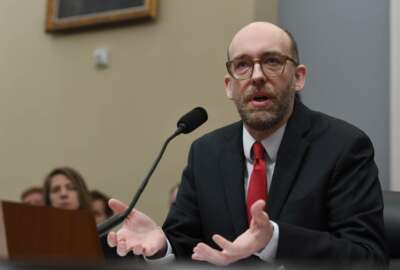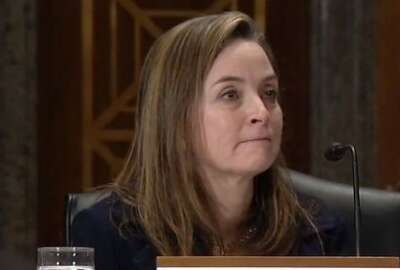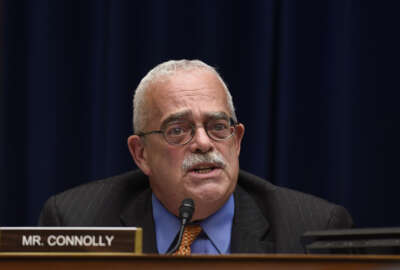
House appropriators propose 3.1% federal pay raise, new money for OPM in 2020 draft bill
The House Appropriations Financial Services and General Government Subcommittee on Monday easily cleared its 2020 funding bill, which includes a 3.1% federal pa...
Best listening experience is on Chrome, Firefox or Safari. Subscribe to Federal Drive’s daily audio interviews on Apple Podcasts or PodcastOne.
House appropriators have broken with the president and proposed a 3.1% federal pay raise for civilian employees in 2020.
Specifically, the proposal suggests a 2.6% across-the-board pay raise with an additional 0.5% adjustment in locality pay. In total, federal employees would receive, on average, a 3.1% raise next year.
Majority members on the House Appropriations Financial Services and General Government Subcommittee have included the raise in a draft 2020 spending bill. The subcommittee quickly moved the bill without objections or amendments at a markup Monday evening. The measure now heads to the full House Appropriations Committee for consideration.
Whenever the Senate subcommittee releases and votes on its version of draft appropriations, both the House and Senate must reconcile any differences between the bill before voting and sending the measure to the president’s desk for his signature.
The Senate subcommittee, led this year by Sen. John Kennedy (R-La.), hasn’t yet introduced its version of this appropriations bill. The Senate last year advanced a 1.9% federal pay raise for civilian employees in 2019. Kennedy at the time had introduced an amendment to eliminate the federal pay raise from appropriations language, but the amendment was rejected.
It wasn’t until after the 35-day government shutdown this year that lawmakers cleared a 1.9% federal pay raise for civilian employees in 2019. Agencies didn’t begin implementing the 2019 raise, retroactive to Jan. 1, until April.
The latest proposal from House appropriators breaks with President Donald Trump, who for the second consecutive year suggested a federal pay freeze for civilian employees as part of his 2020 budget request. The Office of Management and Budget again reiterated its desire to more strategically reward top-performing employees instead of implementing an across-the-board pay raise for all.
But the 3.1% federal pay raise for civilian employees is in line with what the Senate Armed Services Committee has recommended for members of the military in its version of the 2020 defense authorization bill. In addition, the 3.1% pay raise falls in line with the statutory formula, based on Employment Cost Index, that typically sets federal pay.
It’s for both of these reasons that federal employee unions and groups have been pushing House Democrats to make their own recommendation on a raise — and return federal pay itself — to the appropriations process.
“This pay raise is a critical investment in our government’s most valuable resource — its workers,” J. David Cox, president of the American Federation of Government Employees, said Monday in a statement. “It also maintains the decades-long principle of providing equal pay adjustments to the government’s civilian employees and service members.”
The raise would also apply to the vice president and federal employees on the Executive Schedule, according to the legislation’s text.
House Democrats weigh in on OPM’s future
In a blow to the Trump administration’s proposed merger, the subcommittee’s draft bill explicitly prohibits any funding to “reorganize or transfer any function of authority of the Office of Personnel Management to the General Services Administration or the Office of Management and Budget.”
Democrats on the House Oversight and Reform Committee had written to House appropriators back in April, demanding this very scenario if members hadn’t received enough information from the administration about the proposed OPM-GSA merger.
Related Stories

OMB tries again to pitch federal pay freeze, performance awards to Congress

5 questions about the OPM-GSA merger as appropriators return to Capitol Hill

Congress not yet convinced of Trump administration’s proposed OPM-GSA merger
Yet the Trump administration has said Congress has no choice but to reorganize OPM because the agency will face a $70 million shortfall when the National Background Investigations Bureau and its security clearance business move to the Defense Department.
To combat at least part of OPM’s shortfall, House members have proposed $339 million for the agency in appropriations next year, a $43.4 million boost over the 2019’s levels.
A $43.4 million increase for OPM next year would be significant, as lawmakers have never typically been big spenders on the agency in recent history. The agency received $272 million in 2016, $289 million in 2017 and $287 million in 2018, according to past congressional budget justifications.
Margaret Weichert, OPM’s acting director and OMB’s deputy director for management, has said Congress can’t “throw money at the problem” to address OPM’s structural, strategic and IT challenges. Moving OPM’s functions, authorities and resources to GSA and OMB would allow lawmakers to make much-needed investments in government’s ability to forecast and develop a more modern federal workforce of the future, she said.
But congressional approval of a multi-million dollar funding boost for OPM would clearly show lawmakers are willing to reject the administration’s preferred path forward and invest in the agency itself.
“Attempts to justify the reorganization of OPM have fallen flat on Capitol Hill because Congress recognizes the value in maintaining a professional, nonpartisan office to oversee government-wide personnel policy,” Tony Reardon, president of the National Treasury Employees Union, said Monday in a statement.
New language to protect collective bargaining
The House subcommittee draft also includes language that essentially prohibits agencies from implementing or enforcing any collective bargaining agreement or term or article in a CBA that wasn’t mutually agreed to by both a department and its federal union.
Latest Pay & Benefits News
The subcommittee is likely drawing on the experiences federal unions have had with several agencies over the past year.
The Department of Health and Human Services is beginning to implement a series of new articles that its union, the National Treasury Employees Union, said it hasn’t agreed to. Most of the articles closely resemble a decision from the Federal Service Impasses Panel, which stepped in to break up what HHS described as a deadlock between it and NTEU.
After a series of similarly contentious negotiations between the Education Department and AFGE, Education announced plans to enforce new articles on telework, employee performance management and other topics once included in the two parties’ collective bargaining agreement.
AFGE doesn’t recognize the department’s terms as a collective bargaining agreement.
Copyright © 2024 Federal News Network. All rights reserved. This website is not intended for users located within the European Economic Area.
Nicole Ogrysko is a reporter for Federal News Network focusing on the federal workforce and federal pay and benefits.
Follow @nogryskoWFED






